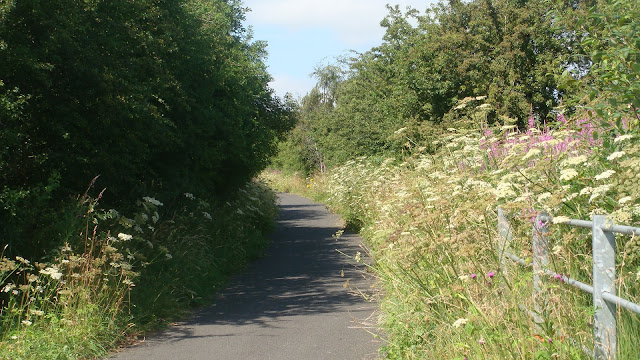This is the finest line I have ever travelled, this little line between Glasgow Central and Paisley Canal, the back track to the bucolic. Not only is it a corridor of a million trees but it has some superb views of the landscape that separates the two cities. And then, if you're like me and jump the train at Dumbreck, a wonderful little platform that no-one uses, you'll find an empty train (most people going to Paisley from Glasgow take the other, less bucolic, line via Cardonald etc.) to sit on with your own bike storage, toilet and coffee table, not to mention those widescreen windows onto the world. It's like your own private TGV. It's amazing. And I ply it regularly down to Paisley Canal where the platform transforms into a cycle path. Talk about your own teleport into the country. You don't have to live in the country when you're privy to such secrets. Because you're already there.
Electric Bikes
The Power of Shout
To shout is to shoot and throw out the voice. It is also, if you've ever listened to politicians bickering, to shit. But the wild cyclist doesn't shit like politicians. The wild cyclist shouts as in banging those ear drums that need to be banged. The shout resonates. The shout is actually the lion roaring. It is a spontaneous and natural reaction to being threatened. To the great sedated however the shout is against the tranquilizing protocols that they run on. The shout upsets their dominating and rapacious worldview. And car-drivers never like to be reminded that their shitting all over the Earth, and that they, along with their rapacious pollutive behaviour, are part of the problem. For a cyclist to shout at a car driver (when said car driver attempts a manoeuvre that de-serves the shout) or a dog-walker for using a five metre leash that screams 'I don't care about anyone other than myself' is a conscientious act. It re-minds people that their behaviour is not acceptable and that they'll get 'shot' when it occurs in my vicinity. It reminds people also that there are others out here that do not subscribe to the rapacious and prammed (eco-existentially deported) worldview. To shout, then, is to shame those needing to be shamed. And let's face it, car drivers and dog-walkers, as those who like to pollute, disembody, and dominate, as those who do not even know what they're doing anymore, need the shaming.
The Infollowability of the Cyclist
This is another reason to cycle. No-one can follow you. Why? Because everyone else drives (is prammed by a pollutant), and cars (toxic boxes), in case you haven't realised already, are not bicycles. They do not possess their slender lightweight form and thus cannot mount kerbs, do instant u-turns, or nip through tight lanes and pathways. The car is thus a dud when it comes to agility and nimbleness. It is also, because of its uselessness at following (and thus tracking), a dud as a hunter, which means it is also a dud as a wild animal. And if you're not a wild animal, what the hell are you?
Backing Your Bike: The Portage
For the wild cyclist, opportunity abounds. Nothing can stop the wild animal from crossing a landscape no matter how high their fences and barriers. This is because the wild cyclist is wild and does not conform to the dangerous domesticity and obedience that most people are embroiled in. The wild cyclist moreover, such is his depth of local territorial knowledge, knows of portals and portages which can propel him into another realm. Every watery landscape has portages. In Gaelic this portage is called a 'tarbert' and all around Scotland there are several places that refer to this directly. This means that in the past Vikings had lifted their longboats, Fitzcarraldo-like, over the dry land that lay between two bodies of water. With the wild cyclist as opposed to the wild Viking, the boat is the bike and the bodies of water are paths and cyclable terrain. This is part of the reason why the wild cyclist (and Viking) is wild: because no barrier can stop him, not waterlessness for a boat nor landlessness for a bike. To be sure, I have carried my bike across and through rivers and streams, but I have also backed my bike across boggy moorland and spongy terrains. Here, I am not just carrying my bike but backing it as in, literally, throwing it on my back, but also as in reciprocating the generosity of said bike: it carries me, so surely I should return the favour once in a while by carrying it. This is one of the defining characteristics of the wild cyclist: that he is not compelled to always cycle but to employ a wide variety of movements (that, together, constitute the 'opera'). In a healthy universe where opposites no longer oppose but conjoin, the not cycling is all part of the cycling, is it not?
Mr Benn's Stage Door
Imagine you lived in a city that had a 'stage door' that opened up straight into space. Imagine living in London, and going through this door and ending up in full country. It would be a miracle right? Yet, in Glasgow and Paisley, two cities that I ply between regularly, we have those doors into the infinite. They're called canal towpaths and sustrans cycleways and they reach, like God's green fingers themselves, right into the very heart of both cities. So, when I arrived at Paisley Canal by train this morning, Mr Benn's stage door was actually on the platform. And when I passed through it, cycling through a bucolic overgrown corridor of wildflowers several kilometres long, I emerged into full country. And became not someone different, as in some fantastical character in a costume, but, cleansed of the claptrap of the city, who I have always been.





